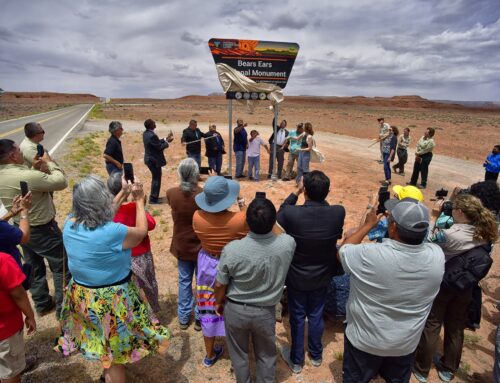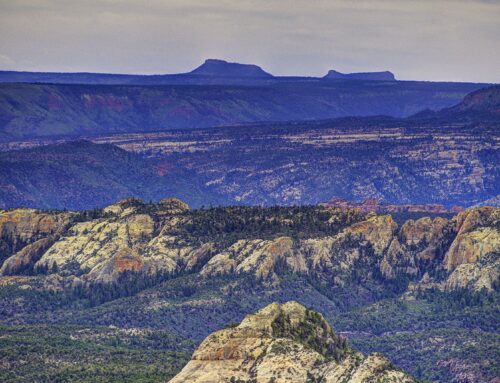
FOR IMMEDIATE RELEASE
Press Contacts:
Natalie Landreth, Native American Rights Fund, 907-360-3423, landreth@narf.org
Matthew Campbell, Native American Rights Fund, 303-447-8760, mcampbell@narf.org
Jared King, Navajo Nation Washington Office, 202-682-7390, jking@nnwo.org
Rollie Wilson, Ute Indian Tribe, 202-340-8232, rwilson@ndnlaw.com
Native American Tribes Remain Opposed to H.R. 4532 at its Second Hearing
Washington, D.C. (January 30, 2018) – Leaders of the five Tribes defending Bears Ears National Monument are disturbed by Representative John Curtis’ (R, Utah) continued defense of his bill (H.R. 4532) to legislatively confirm the President’s unlawful action rescinding and replacing the monument.
H.R. 4532, the “Shash Jáa National Monument and Indian Creek National Monument Act,” is an attack on our sovereignty, it conflicts with the United States’ policy of tribal self-determination, and violates the Federal Government’s treaty, trust and government-to-government relationship with our federally recognized tribes. The bill would also all but eliminate our tribal voice by creating a management council that is dominated by the same state and local interests who have repeatedly called for the elimination of Bears Ears National Monument.
At the request of Democratic Committee members, H.R. 4532 today was the subject of an unusual continuation of January 9th’s hearing in the Subcommittee on Federal Lands of the House Committee on Natural Resources. The request to continue the hearing today was made when only one tribal representative was allowed by the majority to testify at the bill’s first hearing. Today, official representatives of the Hopi Tribe, Navajo Nation, Ute Indian Tribe, Ute Mountain Ute Tribe, and the Pueblo of Zuni all delivered testimony. The full testimonies of the five tribes from today’s hearing may be downloaded here.
“This is not a bill designed to help protect the lands for the tribes,” said Navajo Nation Council Delegate Davis Filfred. “It is a bill that provides near-exclusive control of these federal lands in the state and local counties’ hands, and gives only lip service to tribal interests.”
“Chairman Bishop and Congressman Curtis, as well as other supporters of H.R. 4532, continually make misleading and false claims that they are supporting ‘local tribe’ or empowering the voices of ‘local tribes,’” said Tony Small, Vice Chairman of the Ute Indian Tribe Business Committee. “The ‘local tribes’ Chairman Bishop and Congressman Curtis are referring to are individual tribal members cherry picked by the Congressmen for their support of H.R. 4532, and this bill is an attempt disrupt and undermine tribal governments by negotiating with individual tribal members.”
Clark Tenakhongva, Vice-Chairman of the Hopi Tribe said: “The Hopi Tribe objects to being excluded from authority under H.R. 4532. We reject any assertion that the Hopi Tribe does not belong at Bears Ears. Our clans have long, close, and spiritual connections to these sacred lands and they must be protected. We appreciate the support of numerous other tribes, Members of Congress, and the public to protect Bears Ears National Monument. We oppose H.R. 4532 and support bills that would realize our tribes’ vision for Bears Ears – Representative Gallego’s Bears Ears National Monument Expansion Act and Senator Udall’s ANTIQUITIES Act of 2018.”
Carleton Bowekaty, Pueblo of Zuni Councilman said: “In contrast to the Obama Proclamation’s respect for the tribes’ historic and strong connections to Bears Ears, and the balance it provides to ensure that other interested parties have a voice in management issues, H.R. 4532 contains what we view as a radical provision giving local politicians effective control of management and use decisions.”
“Representative Curtis’ bill retains the same failing as the Trump proclamation: it does not protect the landscape in a way that is meaningful and lasting, and it fragments and disconnects the Bears Ears cultural landscape,” said Navajo Nation President Russell Begaye. “For the bill to claim that it creates ‘the first tribally managed national monument,’ is an affront to tribal sovereignty and an insult to the intelligence of anyone who has actually read the bill.”
Bears Ears has been home to Hopi, Navajo, Ute, Ute Mountain Ute, and Zuni people since time immemorial. Bears Ears National Monument was designated in 2016 to protect countless archeological, cultural, and natural resources. Without appropriate protection, American citizens and the world would lose the opportunity to enjoy one of the most remote and wondrous landscapes found anywhere. The monument is also a celebration of tribal voices, cultures, and sacred sites, all containing timeless volumes of tribal knowledge that our tribes intend to foster and share to promote well-being in our tribal communities, southeastern Utah, and the United States.
#####
In legal matters, the Navajo Nation is represented by the Navajo Nation Department of Justice; the Hopi Tribe, Pueblo of Zuni, and Ute Mountain Ute Tribes are represented by the Native American Rights Fund; the Pueblo of Zuni is represented by Sonosky, Chambers, Sachse, Endreson & Perry, LLP; and Ute Indian Tribe is represented by Fredericks Peebles & Morgan LLP.
The Hopi, Navajo, Ute, Ute Mountain Ute, and Zuni Tribal Governments are working together to defend Bears Ears National Monument. http://ProtectBearsEars.org/



